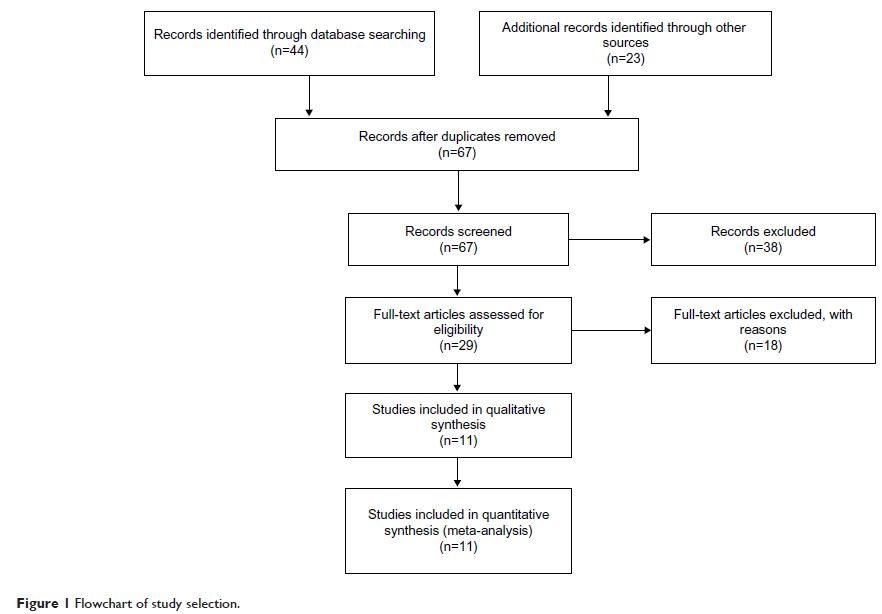108605
论文已发表
注册即可获取德孚的最新动态
IF 收录期刊
- 3.4 Breast Cancer (Dove Med Press)
- 3.2 Clin Epidemiol
- 2.6 Cancer Manag Res
- 2.9 Infect Drug Resist
- 3.7 Clin Interv Aging
- 5.1 Drug Des Dev Ther
- 3.1 Int J Chronic Obstr
- 6.6 Int J Nanomed
- 2.6 Int J Women's Health
- 2.9 Neuropsych Dis Treat
- 2.8 OncoTargets Ther
- 2.0 Patient Prefer Adher
- 2.2 Ther Clin Risk Manag
- 2.5 J Pain Res
- 3.0 Diabet Metab Synd Ob
- 3.2 Psychol Res Behav Ma
- 3.4 Nat Sci Sleep
- 1.8 Pharmgenomics Pers Med
- 2.0 Risk Manag Healthc Policy
- 4.1 J Inflamm Res
- 2.0 Int J Gen Med
- 3.4 J Hepatocell Carcinoma
- 3.0 J Asthma Allergy
- 2.2 Clin Cosmet Investig Dermatol
- 2.4 J Multidiscip Healthc

已发表论文
RUNX3 甲基化频率与大肠癌的相关性与临床意义:一个荟萃分析
Authors Mu WP, Wang J, Niu Q, Shi N, Lian HF
Published Date July 2014 Volume 2014:7 Pages 1237—1245
DOI http://dx.doi.org/10.2147/OTT.S62103
Received 7 February 2014, Accepted 15 March 2014, Published 10 July 2014
Background: The RUNX family, which is composed of RUNX1 , RUNX2 , and RUNX3 , is a sequence-specific transcription factor family and is closely involved in a variety of cellular processes including development, differentiation, participation in the regulation of p53 -dependent DNA damage response and/or tumorigenesis. Emerging evidence indicates that RUNX3 is a candidate tumor suppressor in several types of human tumors including colorectal cancer (CRC). However, the correlation of RUNX3 inactivation with CRC remains unclear. In the study reported here, we conducted a systematic review and meta-analysis to quantitatively evaluate the effects of RUNX3 hypermethylation/expression on the incidence of CRC.
Methods: A detailed search of the literature was made using Medline® and Web of Science for related research publications written in English. The methodological quality of the studies was also evaluated. The data were extracted and assessed by two reviewers independently. Analyses of the pooled data were performed. Odds ratios (ORs) and hazard ratios were calculated and summarized, respectively.
Results: A final analysis of 1,427 CRC patients from eleven eligible studies was performed. We observed that RUNX3 hypermethylation was significantly higher in CRC than in normal colorectal mucosa. The pooled OR from six studies comprising 289 CRC and 188 normal colorectal mucosa was OR =0.07 (confidence interval [CI] =0.03–0.18, P <0.00001). Aberrant RUNX3 hypermethylation/expression was significantly higher in advanced CRC than in early staged CRC (OR =0.54, CI =0.41–0.71, P <0.0001). Aberrant RUNX3 hypermethylation/expression was also significantly higher in microsatellite instability (MSI)-positive CRC than in MSI-negative CRC (OR =0.44, CI =0.3–0.66, P <0.0001). In addition, CRC patients with RUNX3 hypermethylation or lacking RUNX3 protein expression had a lower survival rate than those without RUNX3 hypermethylation or those who did not express RUNX3 protein.
Conclusion: The results of this meta-analysis suggest that RUNX3 hypermethylation is associated with an increased risk of CRC, increased risk of progression of CRC, and a poorer CRC survival rate.RUNX3 hypermethylation, which induces the inactivation of RUNX3 gene, plays an important role in colorectal carcinogenesis, high levels of MSI, as well as CRC progression and development.
Methods: A detailed search of the literature was made using Medline® and Web of Science for related research publications written in English. The methodological quality of the studies was also evaluated. The data were extracted and assessed by two reviewers independently. Analyses of the pooled data were performed. Odds ratios (ORs) and hazard ratios were calculated and summarized, respectively.
Results: A final analysis of 1,427 CRC patients from eleven eligible studies was performed. We observed that RUNX3 hypermethylation was significantly higher in CRC than in normal colorectal mucosa. The pooled OR from six studies comprising 289 CRC and 188 normal colorectal mucosa was OR =0.07 (confidence interval [CI] =0.03–0.18, P <0.00001). Aberrant RUNX3 hypermethylation/expression was significantly higher in advanced CRC than in early staged CRC (OR =0.54, CI =0.41–0.71, P <0.0001). Aberrant RUNX3 hypermethylation/expression was also significantly higher in microsatellite instability (MSI)-positive CRC than in MSI-negative CRC (OR =0.44, CI =0.3–0.66, P <0.0001). In addition, CRC patients with RUNX3 hypermethylation or lacking RUNX3 protein expression had a lower survival rate than those without RUNX3 hypermethylation or those who did not express RUNX3 protein.
Conclusion: The results of this meta-analysis suggest that RUNX3 hypermethylation is associated with an increased risk of CRC, increased risk of progression of CRC, and a poorer CRC survival rate.RUNX3 hypermethylation, which induces the inactivation of RUNX3 gene, plays an important role in colorectal carcinogenesis, high levels of MSI, as well as CRC progression and development.
Keywords: methylation, tumor-suppressor gene, odds ratio, hazard ratio, microsatellite instability
